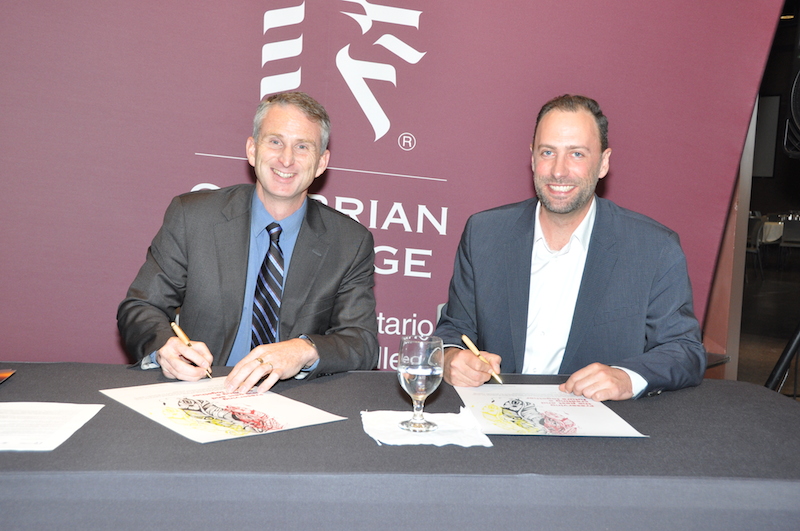
Cambrian College President Bill Best and National Centre for Truth and Reconciliation (NCTR) Director Ry Moran affirm a new partnership between the College and the Centre.
Cambrian College partners with NCTR
Cambrian College has officially become the first college in Ontario to partner with the National Centre for Truth and Reconciliation (NCTR) at the University of Manitoba. On November 23, the College welcomed special guests and hosted activities to highlight this major commitment and to honour and support the objectives of the partnership.
The event served to recognise the partners’ shared commitment to healing through the truth and reconciliation process, which will document the impact of Residential Schools on Survivors, families, communities, Churches, employees, government, and anyone else personally affected. The goal of this process is to guide and inspire Indigenous peoples and Canadians in reconciliation in order to renew relationships based on mutual understanding and respect.
“This is an historic day for Cambrian College and the National Centre for Truth and Reconciliation,” Ry Moran, director of the NCTR said at the event. “Without our partners, the work of the Centre cannot be done. Partners are essential to our success in sharing the history of the Residential School System and Survivors’ stories for generations to come, and in moving Reconciliation forward for all Canadians.”
The NCTR’s mandate is to ensure that Residential School Survivors and their families have access to their own history; that educators can share this history with future generations; that researchers and the public can access materials to understand the experience and foster reconciliation and healing; and that this history and legacy are not forgotten.
As a partner, Cambrian will assist the Centre in its mandate to preserve the memory of Canada’s residential school system and legacy.
Cambrian College will:
- Make the Centre’s archives more accessible and better used throughout all regions of Canada
- Contribute additional holdings to the Centre archives
- Facilitate additional oral history and community narratives, research and reports
- Support a broad scope of public education, research, cultural and reconciliation activities
- Be inclusive of a wide variety of individuals and groups
- Assist the Centre in serving the public in Indigenous (Anishinaabemowin) languages and English and French
- Fulfil regional or community needs and desires related to Residential School research, education and reconciliation.
As a partner, Cambrian College may also be granted delegated access to restricted materials within the collection and may nominate representatives to occupy one of the two partner seats on the Governing Circle. Rick Ouellet, Director of Cambrian’s Wabnode Centre for Aboriginal Services, will be responsible for implementing the partnership at Cambrian in the coming years. He is also humbled and honoured to serve on the NCTR’s Governing Circle. In this role, Ouellet will provide strategic assistance to the NCTR and support the implementation of its community outreach initiatives.
Speaking about the new partnership, Ouellet explained that “the vibrant, dynamic, and exceptional community of Indigenous students at Cambrian are the inspiration and the motivation driving our partnership with the NCTR,” Ouellet said. “By fulfilling our commitments, we will increase opportunities for Indigenous learners and broaden understanding through truth and reconciliation initiatives within the college community and our wider networks.” Ouellet made his comments from British Columbia, where he will today receive his PhD from the University of British Columbia.
Upon his return, Ouellet and his colleagues will continue to implement plans to fulfil the NCTR partnership commitments. For example, in the 2016-17 academic year, Cambrian will provide educational opportunities and experiences for all faculty and staff and will develop opportunities for students to focus on Indigenous culture, traditions and learning perspectives as part of their studies.
Research at the University of Manitoba is partially supported by funding from the Government of Canada Research Support Fund.







Reconciliation is to “restore our relationships” one with another. To accomplish this, we will need something to connect us spiritually. That will be land, water, air and fire. These sacred elements are key to restoring those relationships.